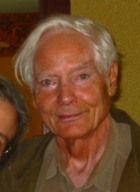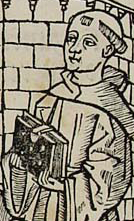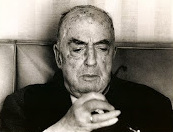This article needs additional citations for verification .(April 2019) (Learn how and when to remove this template message) |
Joan Gili i Serra (Catalan pronunciation: [ʒuˈaɲ ˈʒili i ˈsɛrə] ), also known as John Gili (1907 – 6 May 1998), was a Catalan antiquarian book-seller, publisher and translator. [1]
Joan Gili was born in Barcelona in 1907. His father, Lluis Gili, ran a religious publishing house which also published a cookery book, Sabores, written by his mother, which became a bestseller. While working for his father's company, he developed an interest in English literature, which he wrote about in the Catalan newspaper La Publicitat.
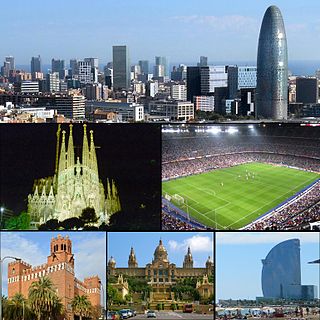
Barcelona is a city in Spain. It is the capital and largest city of the autonomous community of Catalonia, as well as the second most populous municipality of Spain. With a population of 1.6 million within city limits, its urban area extends to numerous neighbouring municipalities within the Province of Barcelona and is home to around 4.8 million people, making it the sixth most populous urban area in the European Union after Paris, London, Madrid, the Ruhr area and Milan. It is one of the largest metropolises on the Mediterranean Sea, located on the coast between the mouths of the rivers Llobregat and Besòs, and bounded to the west by the Serra de Collserola mountain range, the tallest peak of which is 512 metres high.
In 1933, he was invited to visit England, and enjoyed the freedom he experienced there so much that he returned in 1934 to live. He opened the Dolphin Bookshop just off Charing Cross Road in London, specialising in Spanish and Latin American books and manuscripts. Some of the manuscripts on Spanish and Catalan history he collected are now in the Houghton Library at Harvard.

England is a country that is part of the United Kingdom. It shares land borders with Wales to the west and Scotland to the north-northwest. The Irish Sea lies west of England and the Celtic Sea lies to the southwest. England is separated from continental Europe by the North Sea to the east and the English Channel to the south. The country covers five-eighths of the island of Great Britain, which lies in the North Atlantic, and includes over 100 smaller islands, such as the Isles of Scilly and the Isle of Wight.

Charing Cross Road is a street in central London running immediately north of St Martin-in-the-Fields to St Giles Circus and then becomes Tottenham Court Road. It is so called because it leads from the north in the direction of Charing Cross at the south side of Trafalgar Square, which it connects via St Martin's Place and the motorised east side of the square.
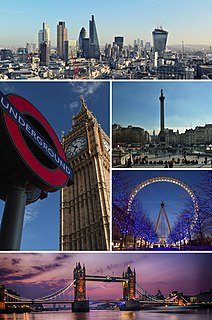
London is the capital and largest city of both England and the United Kingdom. Standing on the River Thames in the south-east of England, at the head of its 50-mile (80 km) estuary leading to the North Sea, London has been a major settlement for two millennia. Londinium was founded by the Romans. The City of London, London's ancient core − an area of just 1.12 square miles (2.9 km2) and colloquially known as the Square Mile − retains boundaries that follow closely its medieval limits. The City of Westminster is also an Inner London borough holding city status. Greater London is governed by the Mayor of London and the London Assembly.
He began publishing books himself in 1938. These included textbooks and literary studies, and translations of Miguel de Unamuno, Luis Cernuda, Juan Ramón Jiménez and Pablo Neruda. In 1939, he and Stephen Spender translated a selection of Federico García Lorca’s poems, one of the first books to introduce Lorca to an English-speaking audience. In the 1950s, Penguin Books asked him to make prose translations of Lorca’s poems; this bilingual edition was a significant influence on several generations of poets and schoolchildren.

Miguel de Unamuno y Jugo was a Spanish Basque essayist, novelist, poet, playwright, philosopher, professor of Greek and Classics, and later rector at the University of Salamanca.

Luis Cernuda Bidón was a Spanish poet, a member of the Generation of '27. During the Spanish Civil War, in early 1938, he went to the UK to deliver some lectures and this became the start of an exile that lasted till the end of his life. He taught in the universities of Glasgow and Cambridge before moving in 1947 to the US. In the 1950s he moved to Mexico. While he continued to write poetry, he also published wide-ranging books of critical essays, covering French, English and German as well as Spanish literature. He was frank about his homosexuality at a time when this was problematic and became something of a role model for this in Spain. His collected poems were published under the title La realidad y el deseo.

Juan Ramón Jiménez Mantecón was a Spanish poet, a prolific writer who received the Nobel Prize in Literature in 1956 "for his lyrical poetry, which in the Spanish language constitutes an example of high spirit and artistical purity". One of Jiménez's most important contributions to modern poetry was his advocacy of the French concept of "pure poetry."
A special interest of his was the Catalan language, which at this time was largely suppressed by the Spanish authorities. In 1943, he produced an Introductory Catalan Grammar which long remained in print. He also published translations, many done by himself, of Catalan poets. These included Carles Riba (Poems, 1964; Tankas of the Four Seasons, 1991; Savage Heart, 1993; Bierville Elegies, 1995), Salvador Espriu (Forms and Words, 1980) and Josep Carner (Poems, translated by Pearse Hutchinson, 1962; Nabí, 1996-8). He was a founding member and later president of the Anglo-Catalan Society.

Catalan is a Western Romance language derived from Vulgar Latin and named after the medieval Principality of Catalonia, in northeastern modern Spain. It is the only official language of Andorra, and a co-official language of the Spanish autonomous communities of Catalonia, the Balearic Islands and Valencia. It also has semi-official status in the Italian commune of Alghero. It is also spoken in the eastern strip of Aragon, in some villages of Region of Murcia called Carche and in the Pyrénées-Orientales department of France. These territories are often called Països Catalans or "Catalan Countries".

Spain, officially the Kingdom of Spain, is a country mostly located in Europe. Its continental European territory is situated on the Iberian Peninsula. Its territory also includes two archipelagoes: the Canary Islands off the coast of Africa, and the Balearic Islands in the Mediterranean Sea. The African enclaves of Ceuta, Melilla, and Peñón de Vélez de la Gomera make Spain the only European country to have a physical border with an African country (Morocco). Several small islands in the Alboran Sea are also part of Spanish territory. The country's mainland is bordered to the south and east by the Mediterranean Sea except for a small land boundary with Gibraltar; to the north and northeast by France, Andorra, and the Bay of Biscay; and to the west and northwest by Portugal and the Atlantic Ocean.
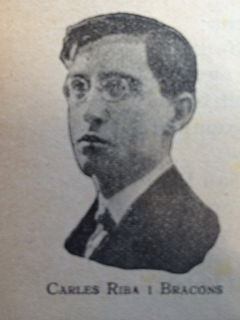
Carles Riba i Bracons was a Catalan poet, writer and translator.
During the Second World War he moved the bookshop to Oxford, where it grew to two floors in a building that had once belonged to the painter Whistler. At first he lived in Park Town in North Oxford. [2] From 1945–69, he lived at 14 Fyfield Road, also in North Oxford, with his family, then moving to Cumnor west of Oxford. In 1948, he became a naturalised British citizen, but although he officially changed his name to John Gili, his friends and family continued to call him Joan.

Oxford is a university city in south central England and the county town of Oxfordshire. With a population of approximately 155,000, it is the 52nd largest city in the United Kingdom, with one of the fastest growing populations in the UK, and it remains the most ethnically diverse area in Oxfordshire county. The city is 51 miles (82 km) from London, 61 miles (98 km) from Bristol, 59 miles (95 km) from Southampton, 57 miles (92 km) from Birmingham and 24 miles (39 km) from Reading.

James Abbott McNeill Whistler was an American artist, active during the American Gilded Age and based primarily in the United Kingdom. He was averse to sentimentality and moral allusion in painting, and was a leading proponent of the credo "art for art's sake". His famous signature for his paintings was in the shape of a stylized butterfly possessing a long stinger for a tail. The symbol was apt, for it combined both aspects of his personality: his art is characterized by a subtle delicacy, while his public persona was combative. He found a parallel between painting and music and entitled many of his paintings "arrangements", "harmonies", and "nocturnes", emphasizing the primacy of tonal harmony. His most famous painting is Arrangement in Grey and Black No. 1 (1871), commonly known as Whistler's Mother, the revered and often parodied portrait of motherhood. Whistler influenced the art world and the broader culture of his time with his artistic theories and his friendships with leading artists and writers.

Park Town is a small residential area in central North Oxford, a suburb of Oxford, England. It was one of the earliest planned suburban developments in the area and most of the houses are Grade II listed.
His role as "unofficial consul of the Catalans in Britain" lead eventually to honours, the Creu de Sant Jordi, from the Catalan government, and the Order of Isabella the Catholic from the Spanish government. However he was reported to be most satisfied by an honorary MA from Oxford University.
He worked until the very end of his life, into his nineties. He married Elizabeth McPherson in 1938. She later produced a translation of his mother's cookery book. They had three children: Jonathan Gili (a documentary film maker), Martin Gili (who carried on, and developed Dolphin books), and Katherine Gili (a sculptress).




